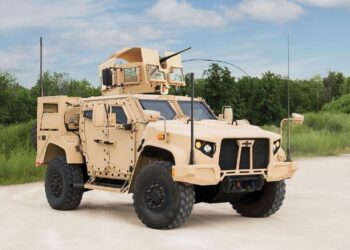In an era where technological advancements are reshaping the landscape of defense, Lithuania is carving out a unique niche with its pioneering approach to venture capital. The country’s sovereign venture capital fund has emerged as a formidable player in the defense tech sector, strategically investing in innovative startups that promise to bolster national security and enhance military capabilities. This article delves into how Lithuania’s commitment to fostering a dynamic defense innovation ecosystem not only positions it ahead of regional counterparts but also highlights the critical role of public investment in nurturing cutting-edge technologies. As global security challenges evolve, Lithuania’s proactive stance serves as a noteworthy example for other nations contemplating similar initiatives.
The Strategic Vision Behind Lithuanias Sovereign VC Fund in Defense Tech
The landscape of defense technology is rapidly evolving, and Lithuania’s sovereign venture capital fund is strategically positioned to lead this transformation.By dedicating resources to innovative defense startups, the fund aims to address both national security needs and global technological competitiveness. Key elements of this vision include:
- Strategic Investments: Focusing on disruptive technologies that enhance defense capabilities, such as AI, cybersecurity, and unmanned systems.
- Partnerships: Collaborating with international defense entities and tech companies to share insights and develop groundbreaking solutions.
- Talent Growth: Investing in local talent through education and incubator programs to cultivate a robust ecosystem around defense tech.
With a well-defined strategy,the fund seeks to harness Lithuania’s unique geopolitical position as a member of NATO and the EU. By concentrating on key areas, the fund looks to ensure that investments contribute not only to national defense but also to the growth of a enduring economy.The framework of the initiative includes:
| Focus Area | Description |
|---|---|
| Cybersecurity | Strengthening defense against cyber threats through innovative tech solutions. |
| AI Technologies | Utilizing artificial intelligence to enhance decision-making processes in defense scenarios. |
| Autonomous Systems | Investing in UAVs and robotics for surveillance and operational efficiency. |

Innovative Funding Approaches and Their impact on National Security
In recent years, innovative funding approaches have emerged as crucial instruments for bolstering national security, particularly in the realm of defense technology.The deployment of sovereign venture capital (VC) funds has shifted traditional paradigms by enabling governments to directly invest in emerging tech companies that play pivotal roles in national defense. By doing so, they not only enhance their military capabilities but also stimulate local innovation ecosystems. Key advantages include:
- Strategic Investment: Governments can prioritize funding in areas that align with national security interests, ensuring that resources are allocated to technologies that may not attract private investment alone.
- Partnerships with Startups: Such funds create synergies between defense needs and startup innovations, fostering a collaborative surroundings that accelerates development.
- Job Creation: Investing in local tech companies contributes to economic growth and job creation in the defense sector.
By establishing these funds, nations like Lithuania are not only securing their borders but also setting a precedent for how state investment can drive tech advancement. This forward-thinking model allows governments to adapt to rapidly evolving threats and ensures that they are not solely reliant on legacy defense contractors. A recent analysis of Lithuania’s approach reveals notable outcomes, as shown in the table below:
| Key Outcomes | Impact on National Defense |
|---|---|
| Increased R&D funding | Enhanced development of breakthrough technologies |
| Support for dual-use technologies | Broader applicability for both civilian and military use |
| Collaboration with NATO partners | Improved interoperability and shared technological advancements |

Key Startups and Technologies Emerging from Lithuanias Defense Ecosystem
Lithuania’s defense tech landscape is rapidly gaining recognition for its innovative startups and cutting-edge technologies. A few notable companies leading the charge include:
- Ferroam - Specializing in advanced sensor technology for battlefield intelligence.
- DroneTech – Pioneering unmanned aerial vehicle solutions designed for reconnaissance and logistics.
- CyberGuard – Focused on cybersecurity solutions tailored for military applications to protect sensitive data.
Furthermore, the synergy between startups and established defense institutions fosters a culture of collaboration and innovation. The following table highlights some of the promising technologies emerging from this ecosystem:
| Technology | Description | Startup |
|---|---|---|
| AI Communication Systems | Enhancing battlefield coordination through clever communication. | AI Warriors |
| Augmented Reality Training | Immersive simulations for preparing troops for real-world scenarios. | SimSpace |
| Autonomous armored Vehicles | Incorporating AI-driven technology for logistics and patrol missions. | ArmorX |

Collaborative Efforts: Partnerships Between Government and Private Sector
The collaboration between government entities and the private sector is essential for the evolution and deployment of advanced defense technologies. Lithuania has recognized the potential of this synergy through its sovereign venture capital fund, wich actively seeks to invest in startups that focus on innovative defense solutions. By facilitating direct partnerships with private companies, the government not only bolsters local industry but also enhances national security capabilities. This strategic investment strategy aims to harness the ingenuity of the private sector to develop cutting-edge technologies, while together ensuring that Lithuania remains at the forefront of defense innovation.
Key elements of accomplished partnerships between government and the private sector include:
- Resource Sharing: Governments can provide funding and regulatory support, while private firms contribute their technical knowledge and agility.
- Risk Mitigation: Collaborations can distribute risks associated with high-tech investments, making it more feasible for startups to develop and test their products.
- Innovation Ecosystem: A strengthened ecosystem encourages knowledge transfer and creates an environment conducive to research and development.
To give more insight into the types of initiatives being supported, here’s a snapshot of some focus areas for investment:
| Focus Area | Description |
|---|---|
| Cybersecurity | Building robust systems to protect national data and infrastructure. |
| Autonomous Systems | Developing drones and automated vehicles for intelligence and logistics. |
| AI Technologies | Integrating artificial intelligence for enhanced decision-making capabilities. |

Global Implications: How Lithuanias Model Can Influence Defense Investment Strategies
The Lithuanian model of utilizing a sovereign venture capital (VC) fund to propel defense technologies presents a compelling case for nations seeking to enhance their military capabilities through innovative financing mechanisms. As global tensions escalate and the need for robust defense solutions grows, countries can draw from Lithuania’s approach, which emphasizes strategic investment in startups and emerging technologies.This model not only diversifies the sources of defense funding but also fosters a dynamic ecosystem that integrates collaboration between government, private sector partners, and academic institutions. the adaptability of Lithuania’s strategy showcases how small nations can maximize limited resources to remain competitive on the global defense stage.
By investing in defense technology, Lithuania effectively transforms national security into a catalyst for economic growth. This approach could inspire other countries to reassess their defense investment strategies, leading to a ripple effect that encourages them to prioritize innovation. Key factors of Lithuania’s model include:
- Public-Private Partnerships: Fostering collaboration between the government and the private sector for effective resource allocation.
- Focus on Startups: Targeting emerging companies that offer cutting-edge solutions in defense technology.
- Agility and Adaptability: Encouraging flexibility in investment strategies to rapidly respond to evolving threats.
Furthermore, as the geopolitical landscape continues to shift, the establishment of a sovereign VC fund can serve as a template for developing resilient defense infrastructures worldwide. By prioritizing investment in innovative defense solutions, Lithuania not only strengthens its own national security but also positions itself as a thought leader in global defense strategy, influencing other nations to follow suit in their own pursuits of technological advancement and strategic autonomy.

Recommendations for Policymakers to Enhance Defense Tech Ventures
To bolster the defense technology landscape, its essential for policymakers to establish a robust framework that encourages collaboration between the public and private sectors. This can be achieved by:
- Creating Incentive Programs: Offer tax breaks, grants, or low-interest loans for startups in the defense tech space to stimulate innovation.
- Fostering public-Private Partnerships: Facilitate collaboration between defense contractors and tech startups to share knowledge and resources, driving efficiency and reducing costs.
- Enhancing Regulatory Support: Streamline regulations to allow quicker deployment of new technologies without compromising national security standards.
Moreover, establishing a dedicated advisory board consisting of industry experts will assist in identifying key areas for investment and development. This board can help shape strategic priorities by:
- Identifying Emerging Technologies: Regularly assessing the technology landscape to stay ahead of global trends and threats.
- Facilitating Access to Capital: Providing a platform for innovative firms to connect with potential investors and secure funding for their projects.
- Promoting Education and Skills Development: Supporting initiatives that enhance workforce skills relevant to emerging defense technologies.
To Conclude
Lithuania’s sovereign venture capital fund has positioned itself as a pioneering force in the defense technology sector, demonstrating a proactive approach that sets it apart on the global stage. By strategically investing in innovative startups and fostering a robust ecosystem for defense tech, Lithuania not only safeguards its national interests but also contributes to the broader European security landscape. As the geopolitical landscape continues to evolve, the importance of such forward-thinking initiatives cannot be overstated. As other nations look to bolster their own defense capabilities, Lithuania’s model may serve as a blueprint for effectively harnessing the potential of technology to enhance national security. The resilience, agility, and vision of Lithuania’s investment strategies could very well inspire a wave of similar initiatives around the world, underscoring the critical intersection of technology and defense in shaping the future.
















Ryan Gravenberch withdraws from Netherlands squad with injury – BBC.com